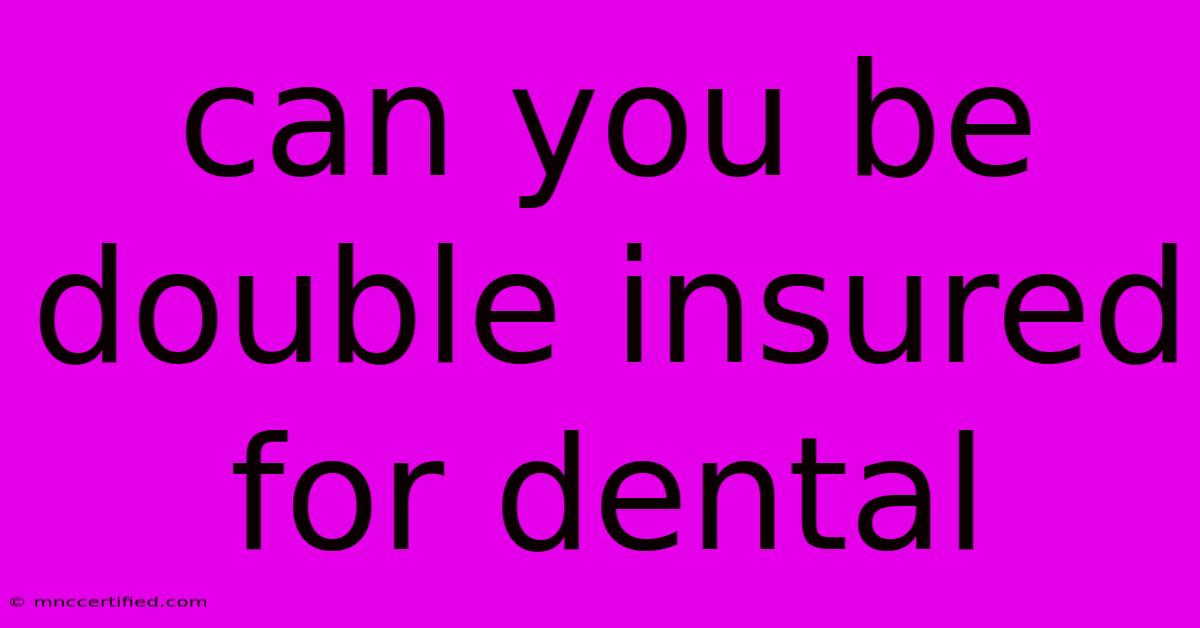Can You Be Double Insured For Dental

Table of Contents
Can You Be Double Insured for Dental? Exploring Your Options
Dental care can be expensive, and seeking out multiple sources of coverage can be tempting. But can you be double insured for dental? The answer is not a simple yes or no. It depends on the specific circumstances, including the types of dental insurance you have and the terms of your policies.
Understanding Different Types of Dental Insurance
Before we delve into the specifics of double insurance, it's crucial to understand the main types of dental coverage:
- Individual Dental Insurance: Purchased directly by an individual, typically through a private insurance company. These plans often offer more flexibility in terms of coverage and provider selection.
- Employer-Sponsored Dental Insurance: Provided as a benefit by your employer. These plans typically have a narrower network of providers and may have specific limitations.
- Government-Funded Dental Insurance: Available for certain eligible individuals and families, such as those on Medicare or Medicaid. These programs have strict eligibility criteria and limited coverage.
The Double Coverage Dilemma
The most common scenario where double coverage becomes a factor is when you have both individual and employer-sponsored dental insurance. The key question then becomes: Which plan will cover your dental expenses first?
- Primary Plan: The primary plan is the one that covers your dental expenses first, typically the one you have held the longest or the one that is considered "primary" in your policy.
- Secondary Plan: The secondary plan steps in after the primary plan has paid its portion of the covered expenses.
The terms of each policy will dictate how the coverage works. Some policies may explicitly state that they are secondary, meaning they won't cover any expenses until the primary plan has exhausted its coverage.
Considerations for Double Coverage
While the idea of double coverage might seem appealing, there are some important factors to consider:
- Potential Overlap and Waste: Double coverage can lead to overlapping coverage, potentially resulting in wasted premiums.
- Coordination of Benefits: Dental insurance plans have "Coordination of Benefits" (COB) clauses that define how they interact with other insurance plans, including other dental plans. Carefully review these clauses to understand how your coverage will work if you have multiple plans.
- Provider Networks: Make sure your preferred dentist is in-network with both insurance plans. If not, you may face higher out-of-pocket costs.
- Premium Costs: Double coverage often means paying higher premiums. Weigh the potential benefits against the additional costs.
The Bottom Line
Whether or not you can be double insured for dental depends on the specific circumstances. It's crucial to review the terms of your policies, understand the coordination of benefits, and consider the potential benefits and drawbacks before making any decisions.
Remember, the best way to navigate double dental insurance is to consult with a licensed insurance agent or broker who can provide personalized advice based on your specific situation.

Thank you for visiting our website wich cover about Can You Be Double Insured For Dental. We hope the information provided has been useful to you. Feel free to contact us if you have any questions or need further assistance. See you next time and dont miss to bookmark.
Featured Posts
-
Alta Extended Title Insurance Policy
Nov 11, 2024
-
Lamine Yamal Injury How Long Will He Be Out
Nov 11, 2024
-
Does Illinois Require Boat Insurance
Nov 11, 2024
-
1989 Topps Barry Bonds Baseball Card
Nov 11, 2024
-
Pakistan Beats Australia In 3rd Odi Match
Nov 11, 2024